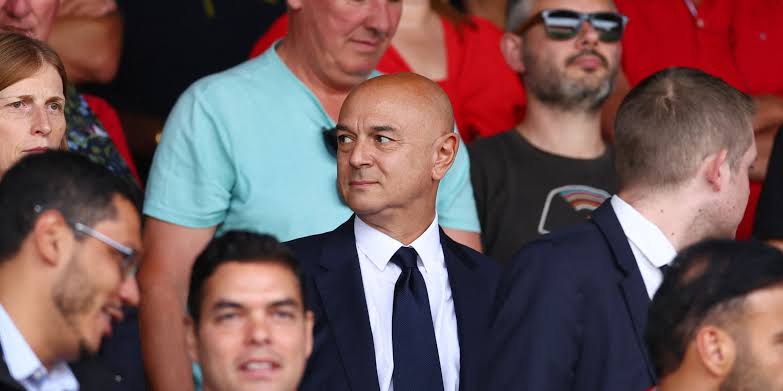“Terrible Decision, he wasn’t given enough time”- Spurs player Daniel Levy let to leave for just £750k, now he’s being compared to a £100m star
Tottenham Hotspur’s recent recruitment success has been crucial in shaping the team’s prospects, with head coach Ange Postecoglou now armed with a roster capable of mounting a serious challenge for Champions League football. After years of inconsistent investment and hit-or-miss signings, Spurs have shifted to a more strategic approach, resulting in a squad that balances experience, youth, and versatility. Postecoglou’s first season saw the Australian manager guide Tottenham to a respectable fifth-place finish in the Premier League, just shy of a top-four spot. Though missing out on the Champions League was disappointing, the team secured a Europa League position, laying a solid foundation for the current campaign and proving that Postecoglou’s style and tactics can yield strong results.
One of the biggest changes over the past couple of seasons has been Tottenham’s recruitment philosophy. Key signings such as Dominic Solanke, Lucas Bergvall, and Timo Werner have not only bolstered the team but allowed them to hit the ground running in their European campaign, making a flawless start in the Europa League. This recent success reflects the influence of a more measured approach from the club’s hierarchy, a stark departure from the erratic spending habits that once drained Tottenham’s resources. Just a few seasons ago, the club’s high expenditure didn’t necessarily translate to effective on-field performance. In fact, these lavish investments occasionally hindered Tottenham’s progression, costing them both financially and competitively.
The 2019/20 season was a particularly telling period for the club. Following four successive top-four finishes, Tottenham’s board and owner Daniel Levy faced pressure to push the team to even greater heights, especially after the heartbreak of their 2019 Champions League final loss. To meet these high expectations, Levy greenlit an ambitious spending spree, investing over £100 million in new players in hopes of turning Tottenham into title contenders. However, the new additions did not live up to the hype. Prominent signings like Ryan Sessegnon, Giovani Lo Celso, and Tanguy Ndombele struggled to make a lasting impact. Ndombele, who arrived for a club-record £63 million, was one of the most significant disappointments; despite high hopes, his Tottenham tenure was plagued by inconsistency and fitness issues. He departed for Ligue 1’s OGC Nice after just 91 appearances, a stark contrast to the expectations that accompanied his high-profile move.
Levy’s substantial outlay didn’t stop there. Another young player who generated excitement was Jack Clarke, signed from Leeds United for £8.5 million. Clarke’s quick dribbling and ability to take on defenders seemed like the perfect addition to Spurs’ attack, and the club saw him as a promising investment for the future. However, Clarke’s time in North London was challenging, and he struggled to establish himself in the senior team, managing only four first-team appearances before being loaned out multiple times. Eventually, Clarke left Tottenham permanently, joining Sunderland for a relatively modest £750,000. The move to Sunderland, however, turned out to be exactly what Clarke needed to find his footing, and he excelled in the Championship, notching 27 goals in 94 appearances. His success helped Sunderland come close to promotion, and Clarke established himself as one of the league’s standout players.
Clarke’s impressive performances at Sunderland soon captured attention, culminating in a move to newly promoted Ipswich Town, where he finally gets the opportunity to showcase his skills in the Premier League. His recent performances have even drawn comparisons to Manchester City’s Jack Grealish. Former Arsenal player Alan Smith likened Clarke to Grealish, noting their similar playing styles. Statistically, the comparison is not unfounded: Clarke has matched Grealish’s goal and assist contributions so far this season. Additionally, Clarke has recorded more successful take-ons per game than Grealish, with a higher success rate, all while playing fewer minutes, highlighting his efficiency and impact.
Tottenham’s decision to part ways with Clarke for £750,000 may be seen in hindsight as a missed opportunity, especially given his recent form. Although Spurs benefited from a sell-on clause when he moved to Ipswich, the modest initial fee has left many fans questioning whether the club acted prematurely. His development in the Championship and eventual Premier League breakthrough suggest that Clarke could have been a valuable asset in Postecoglou’s current system, perhaps even as an alternative to Timo Werner or Lucas Bergvall. The debate over Clarke’s departure underscores the shift in Tottenham’s approach: where they once struggled to get a return on their investments, they are now reaping the benefits of a more calculated strategy.
As Tottenham continues to progress under Postecoglou’s leadership, the contrast between their past and present approaches to transfers highlights how far the club has come. After years of frustrating investments and underwhelming returns, the club’s recent decisions seem to be paying off, positioning Spurs to finally reclaim their place among the Premier League’s elite. With a combination of well-chosen signings and a manager who has instilled a strong identity and tactical clarity, Tottenham looks more prepared than ever to challenge for a top-four finish. However, the story of Jack Clarke remains a lingering reminder that, in football, timing and patience can be just as crucial as talent and ambition.
